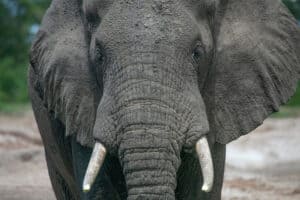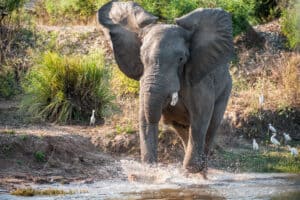Ah, wonderful, relaxing sleep–all animals need it. Sleeping is the perfect way to recharge after a long day (or night). Some species are diurnal, while others are nocturnal or crepuscular. Some animals, like cats and sloths, sleep as much as 20 hours per day, while others like giraffes get a mere three to four hours of shut-eye every night. But what about elephants’ sleeping habits?
When and how much do elephants sleep, and why? Are they able to sleep standing up, and do they dream when they snooze? Join me as I take an in-depth look at elephants’ sleep patterns and behaviors. We’ll explore all the questions you probably have about how these gentle giants slumber!
Are Elephants Diurnal Or Nocturnal?
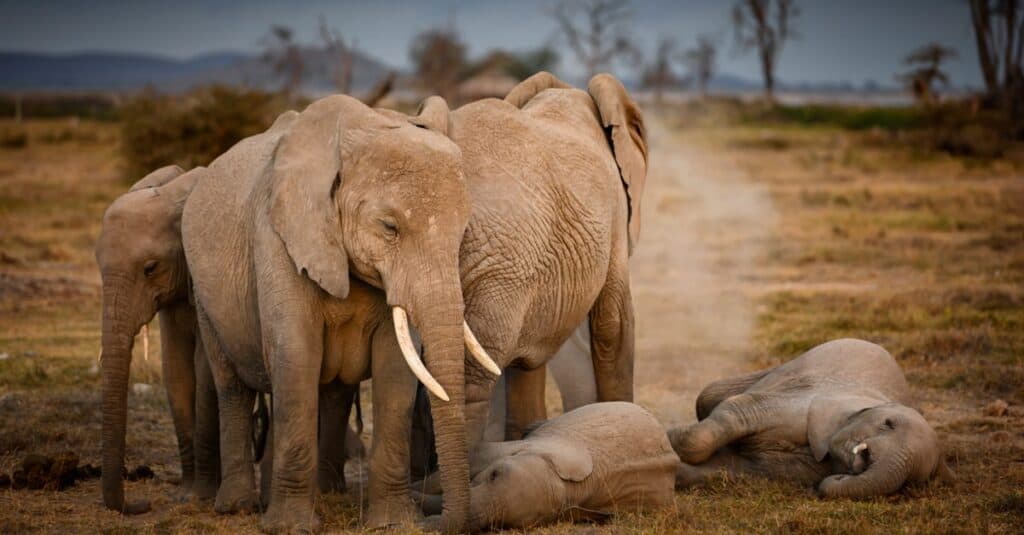
A herd of elephants getting some much-needed sleep
©iStock.com/Devilkae
Elephants are loosely diurnal, meaning they are usually awake during the day and mostly sleep at night. However, their sleep schedules vary significantly depending on their species. This contrast is primarily thanks to the fact that African and Asian elephants’ habitats are located on vastly different continents.
As a result, African and Asian elephants’ sleeping habits have evolved in their own uniquely divergent ways. These species have different predators to look out for, different environmental factors to adapt to, and a lot of variation between their diets because their habitats are so vastly different.
African elephants, for example, are almost entirely diurnal, but their sleep is spread out over many small sessions. They spend around 12 to 14 hours a day foraging across the African savanna for food. In the meantime, they will often take short naps lasting for 5 to 30 minutes or so while standing up to conserve energy. They get most of their sleep late at night between the hours of 1:00 and 6:00 AM.
Asian elephants, on the other hand, are more crepuscular in nature. This means they are awake and most active during dawn and dusk, or very early in the morning when the sun rises and in the evening when the sun sets. Their sleep is similarly spread out over several short naps while standing up (again, usually anywhere from about 5 to 30 minutes) whenever they can get it.
How Much Do Elephants Sleep Each Night?
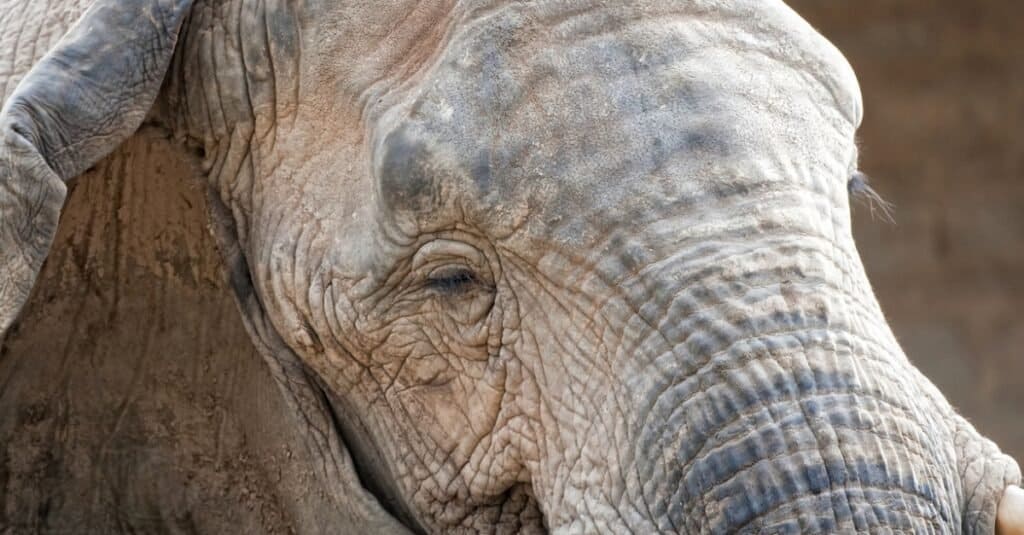
A close-up of an elephant sleeping
©iStock.com/Stephen_Edwards
Elephants are some of the lightest sleepers in the animal kingdom! On average, both African and Asian elephants only get around 2 to 3 hours of sleep per day in the wild, while elephants in captivity get a bit more at around 3 to 7 hours each day.
As we touched on earlier, an elephant’s sleep is spread out over many short sessions. These sessions can range from a few brief minutes to as long as an hour at a time. Usually, though, their naps are only 5 to 30 minutes in length.
Why these animals have such an unusual sleep schedule is still a bit of a mystery to animal behaviorists, but they do have a general hypothesis that partially explains it.
Basically, because elephants must graze on such massive amounts of plant matter to sustain themselves, they simply aren’t able to rest much in the meantime. In fact, studies have found that elephants will sometimes even eat in their sleep!
Do Elephants Sleep Standing Up?
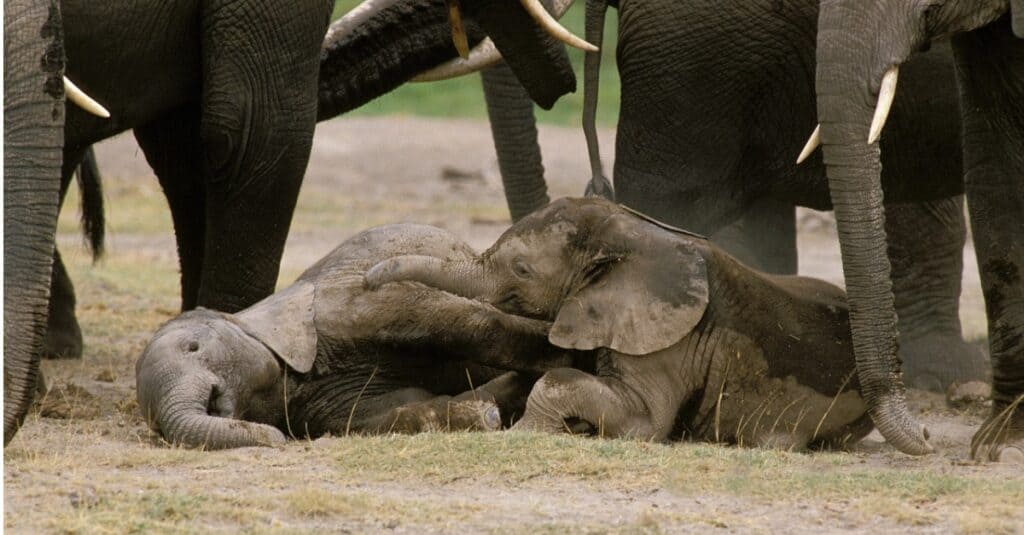
A couple of
baby elephants
prepare to take a nap, protected by their watchful herd
©iStock.com/slowmotiongli
Generally, wild African and Asian elephants both prefer to sleep standing up. However, captive elephants will sometimes choose to lie down to sleep.
Due to the fact that elephants usually only sleep for around 5 to 30 minutes at a time and are always on the move, they tend to stay standing up while they snooze out of convenience. Staying upright also makes them less vulnerable to predators. After all, they can make a much faster escape if they’re already standing.
Additionally, elephants in captivity don’t have predators or food scarcity to worry about. This makes them far more lax about their sleep schedules and behaviors than their cousins in the wild. As a result, captive individuals can afford to be more vulnerable in exchange for a more comfortable and restful sleep.
Do Elephants Dream?
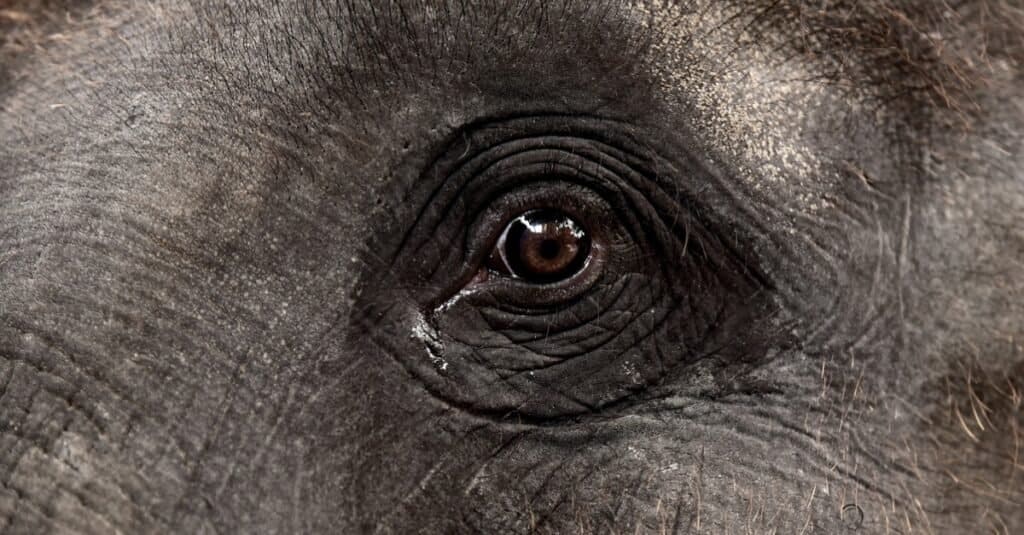
A close-up of an Asian elephant’s eye
©iStock.com/Kreangagirl
Most animal species dream vividly while they sleep, from cats and dogs to birds and even rodents. Sadly, elephants usually don’t have enough time to dream. This is mostly thanks to their odd sleep schedules and the fact that they’re always foraging and on the move.
Technically, dreams can take place during any time while an animal sleeps, but they most frequently occur during the REM (rapid eye movement) sleep stage. This is when the brain is most active.
Notably, REM sleep doesn’t start until an animal has been asleep for at least 90 minutes. Because elephants typically only sleep for short periods, they don’t have enough time to drift into REM sleep before they wake up and start moving again.
There are, of course, occasional exceptions to this, as elephants’ sleeping habits vary wildly from day to day. Captive elephants get more sleep and thus dream more often, while those in the wild rarely dream at all.
The photo featured at the top of this post is © iStock.com/Devilkae
Thank you for reading! Have some feedback for us? Contact the AZ Animals editorial team.



